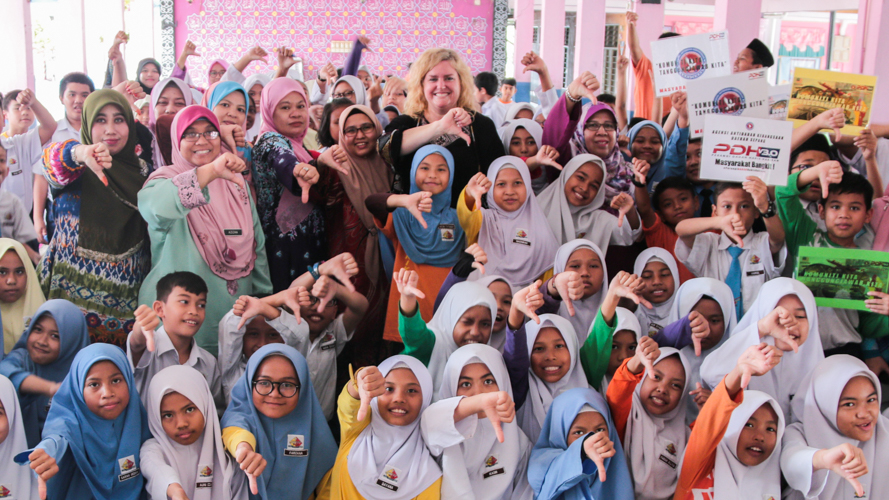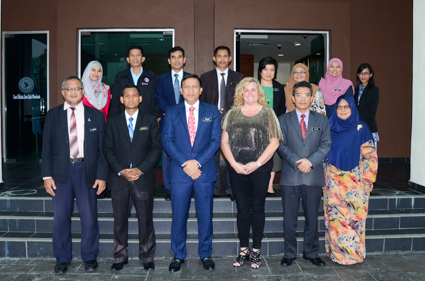Fulbright Specialist from Iowa State evaluates drug prevention education in Malaysia
01/28/2019

Cathy Hockaday and Malaysian school children give a “thumbs down” to indicate they will say no to drugs. Photo courtesy of Malaysia's National Anti-Drugs Agency.
AMES, Iowa — Cultures may be different, but families face similar problems. Cathy Hockaday says this is her greatest takeaway from serving as a Fulbright Specialist in Malaysia in fall 2018.
Hockaday coordinates the “Strengthening Families Program: For Parents and Youth 10-14,” an evidence-based and family-based prevention program from Iowa State University Extension and Outreach. She spent a month in Bandar Baru Bangi, Malaysia, reviewing family and school-based prevention programs and developing a plan for monitoring and evaluating the country’s preventative drug education. She was hosted by the National Anti-Drugs Agency in Malaysia’s Ministry of Home Affairs.
The U.S. Department of State, Bureau of Educational and Cultural Affairs established the Fulbright Specialist Program in 2001. U.S. academics and professionals are paired with host institutions abroad to share their expertise. They gain international experience and learn about other cultures while building capacity at their overseas host institutions.
Malaysia has several drug prevention education programs designed for age groups ranging from young children to adults, but hadn’t confirmed whether the programs really work. Hockaday’s task was to study drug prevention education activities in Malaysia and teach National Anti-Drugs Agency prevention coordinators and workers how to assess whether their programs were effective. She also taught them how to develop tools and techniques for collecting data, as well as systematic monitoring to measure program effectiveness. The end goal was to ensure accountability and support evidence-based decision-making.
In addition, she provided intensive training in the Strengthening Families Program: For Parents and Youth 10-14. SFP 10-14 has been implemented in more than 25 countries since 1993. Following a 2002 Cochrane Review of 6,000 prevention programs, the World Health Organization named SFP 10-14 the number one prevention program for long-term effects on substance use and misuse.

Cathy Hockaday (front row, third from right) worked with members of the National Anti-Drugs Agency while serving as a Fulbright Specialist in Malaysia. Photo courtesy of Malaysia’s National Anti-Drugs Agency.
“SFP 10-14 has been taught in South Africa, Peru and now Malaysia. The message is the same. Families around this world are all dealing with similar problems. Their families are like our families,” Hockaday said .
“My role as SFP 10-14 coordinator includes working with nonprofits, schools, faith-based and statewide agencies, military installations and universities worldwide. My position has evolved from simply coordinating the program, to exploring creative partnerships everywhere to help at-risk youth,” Hockaday said.
Hockaday also serves as a national expert on two opioid panels focused on drug prevention. They are working to make sure universities and agencies that serve families are aware of gold-standard practices for implementing research- and evidence-based programs.
Hockaday applied for the Fulbright Specialist Program for the opportunity to be immersed in another culture and learn the traditions, values, beliefs and customs.
“Listening is the most important skill a person can have when working with other cultures. I do not believe I am the expert in any situation, especially when other cultures are involved. I talk about what works best in my culture, but then ask how their culture’s traditions and values could be integrated into the activities to honor local families,” Hockaday said.
“We have found this to be useful even with different cultures within the United States, as we have collaborated with other organizations to adapt SFP 10-14 for use with the military and with Native Americans,” she added.
“We have worked with several countries to adapt the curriculum to be more culturally relevant. People do not need to speak the same language to come to a mutual understanding of how to improve the lives of families,” Hockaday said.
Hockaday plans to share the process undertaken in Malaysia with others who are developing program evaluation plans. She is serving a three-year tenure in the Fulbright Specialist Program.
Key contacts
Cathy Hockaday, Strengthening Families Program: For Parents and Youth 10-14 Specialist, College of Human Sciences Extension and Outreach, hockaday@iastate.edu, (515) 294-7601.
Isaac Sinclair, communications assistant, College of Human Sciences, hswriter@iastate.edu, (515) 294-1326.